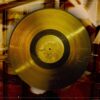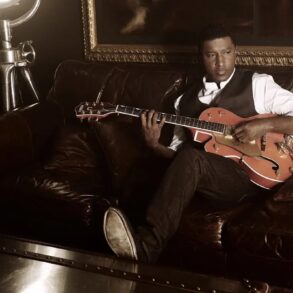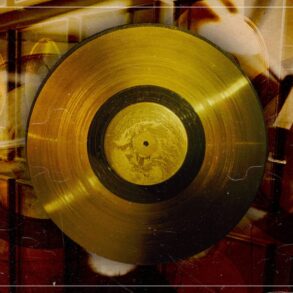In 2014, Just Us marked the return of German art revolutionaries Faust, at that point as a duo. Bassist Jean-Hervé Péron drew Prog a line from their 1970s origins to their latest work, discussing unpredictable sounds, a tour that promised no hits – but the real possibility of seeing old ladies knitting on stage with the band.
Even by the idiosyncratic standards of the krautrock movement that countered the UK’s progressive rock splurge in the early 70s, Hamburg’s Faust were plainly a peculiar breed. Named after the German word for ‘fist’ – with all the revolutionary and devilish connotations such a moniker entailed – they were a band who eschewed all the usual rock’n’roll tropes in favour of an ethos that elevated their status from adventurous musical ensemble to frequently mind-bending art collective, making several seminal albums along the way.
Unlike their native contemporaries in Can, Neu! and Kraftwerk, Faust started with a clean slate, jettisoning traditional musical ideas and any semblance of blues or pop, and building their bewildering and diverse sound from scratch.
They incorporated anything and everything, from primitive electronics to surreal visuals, in relentless pursuit of the new. Progressive in both word and deed, they were a mesmerising anomaly 40 years ago, and they remain so today.
Faust in 2014 number just two of their original line-up – drummer Werner ‘Zappi’ Diermaier and French-born bassist Jean-Hervé Péron; standard bearers for the original principles upon which the band were founded in 1971.
Faust have had a sporadic recording history and regular bouts of interpersonal turbulence; until fairly recently there were two legitimate incarnations in action, following an abrupt parting of ways with keyboardist Hans Joachim Irmler a decade ago.
Yet the overwhelming character of new album j US t – pronounced ‘Just Us’ – is one of wide-eyed exploration and limitless sonic scope, albeit still driven by the pointedly non-virtuoso approach that made krautrock such a distinct entity from its distant prog relatives.
“Fortunately we are bad musicians!” laughs Péron. “We couldn’t play the riffs by those fantastic progressive rock guitar players. Maybe I’m joking, maybe I’m not; I’m not sure! But it was a decision for many German bands.
We couldn’t play virtuoso guitars and bass… we gave more importance to structures, methods and meanings
“The young German people, our generation – I’m not German, but I do feel German – we were all looking for our own identity. We loved everything that was coming from the States and the UK, but we wanted to do our own stuff.
“Combined with the fact that we couldn’t play virtuoso guitars and bass… we looked into different realms, like electronic music and field recordings. We gave more importance to structures and methods and to lyrics and meanings.”
One factor that always set Faust apart was the total absence of any influence from blues or rock’n’roll, even to the extent that early albums like So Far and Faust IV showcased a wilful dismantling and reconstruction of sonic norms.
Even when playing something approaching a normal rock song – for instance, the comparatively straighforward The Sad Skinhead on Faust IV – the band were plainly hellbent on wringing fresh inspiration and something deliciously alien from well-worn ingredients.
“We were influenced by all kinds of things,’ says Péron. “The sounds I heard in my mother’s belly, the music I heard on the radio when I was a teenager. You can’t escape what’s around you, and why should you? As the 60s ended, social, religious and sexual structures and education systems were given big question marks, and so art followed.
“Dadaism and surrealism had existed before, of course, but with most theoretical movements, it’s like a bass sound. If you have your head right next to the cabinet, it’s not as loud or as clear as if you’re six metres away. It takes a while for the deep frequencies to develop.”
We never saw what we were doing as just music… concerts always mingled with things happening
In keeping with their lack of interest in traditional music industry obsessions, Faust’s most notable moment of commercial glory came almost by accident. They signed with Richard Branson’s nascent Virgin imprint in 1973 and, for their first release, unleashed The Faust Tapes: 43 minutes of interwoven song segments and found sounds culled from a year-long residency at Wümme Studios.
It retailed for an irresistible 49p – the price of a single at the time. The album sold remarkably well; but it’s hard not to have a retrospective giggle at what some of the reactions to this wildly experimental and purposefully subversive record must have been.
“After we’d been kicked out of Polydor Records because we were not The Beatles, we went to Virgin,” Péron recalls. “The truth is, we never rehearsed at Wümme; we were just playing, so we had many hours of recordings.
“We took those and made a collage, and that’s The Faust Tapes. It was a very clever tactical manoeuvre from Richard Branson, selling an album at the price of a single. Many people bought it to play frisbee with! But it worked.”
While albums like Can’s Tago Mago and Neu!’s eponymous debut remain standard fixtures in all-time greatest albums lists, Faust have never quite received the acclaim or recognition that their myopic bravery deserves.
Even today, Péron admits they struggle to find promoters in Germany who fully grasp what they’re all about – which explains why their live performances are both intermittent and legendary.
Faust IV was very listenable and it sold well… I saw how the audience changed after that
The real sticking point seems to be that Faust have always regarded themselves as artists first and makers of music second. This makes them a fascinating proposition for those of us who demand a little more from music than catchy tunes and cosy familiarity, of course. But profit-orientated record companies can be forgiven for not being quite so patient or enthusiastic.
“It was always a problem, yeah,” Péron smiles, with a mischievous twinkle in his eye. “We never saw what we were doing as just music. The few concerts that we did, we always mingled with things happening… paintings, actions, lots of lyrics, decorating the room while playing and so on. And that’s not commercial. It has always been like this for us.”
Their most accessible moment came with Faust IV, a stone cold classic that opens with the epic Krautrock itself. If only briefly, it made their music seem a little more palatable to the masses. “Faust IV was very listenable and it sold well, yes, and I saw the audience and how it changed after that,” says Péron.

“For the first three LPs, it was an intellectual, male audience, rather middle-aged. Suddenly we got a really mixed crowd. So those are the people that bought our LPs. Why they did it… they liked something in it, triggered by The Faust Tapes, maybe. Faust IV is not commercial, but it’s not hardcore either.”
In recent times, they’ve continued to pursue their noble artistic aims, sometimes joining forces with like-minded souls – most notably left-field hip hop crew Dälek and industrial oddballs Nurse With Wound – or recruiting additional members to embellish their own ideas, as on 2011’s Something Dirty, which featured the talents of James Johnston from bluesy punk mob Gallon Drunk and painter Geraldine Swayne.
A sound engineer set up a very basic recording situation at my place and the same at Zappi’s, so we had all the time in the world
The Faust of Just Us, however, is very much a two-man operation and, predictably perhaps, the result of another happy accident. “How did this happen? Well, this is like a flower that grew on a lump of shit,” grins Péron. “At the end of 2012, Zappi and I started a project that was just the two of us, recording ground tracks and then sending them to different friends, asking them to add something.
“The idea was to do an audio cadavre exquis [‘exquisite corpse’ – a way of creating art by assembling a collection of ideas], and it didn’t work, for reasons I don’t want to go into. So we decided to do it the way we did the You Know FaUSt album [1997], with home recordings. We asked a sound engineer to set up a very basic recording situation at my place and the same thing at Zappi’s place, so we had all the time in the world. It’s not a fancy production. It’s not totally raw but it’s very spontaneous.”

The coming year should see Faust embarking on a slightly more rigorous touring schedule than in recent times, although anyone expecting a cursory trot through the band’s greatest hits – clue: there aren’t any – should probably steer well clear. Just as it was in 1971, the duo’s ethos remains firmly rooted in lofty artistic goals and an unerring dedication to creating something that aims higher than mere entertainment.
“Anything can happen, it’s true,” Péron says. “We invite people to perform with us. It could be a painter, a mason, a guitar player, a poet, a politician, ladies knitting, vacuum cleaning – whatever comes our way.
You see ladies knitting and a German rock band playing… this disbalance is optimal for absorbing the message
“I remember having a cleaning lady onstage once. She was doing her job with dedication before the venue opened and she was doing it with a dignity and thoroughness, so I invited her to make sure the stage remained clean while we were playing. She vacuum- cleaned and dusted while we played.
“It brings things together that aren’t supposed to happen, and that brings distortions to your perception. You see ladies knitting and a German rock band playing; this doesn’t fit, and your mind asks, ‘Why? What’s happening?’ and this disbalance is optimal for absorbing the message, for reflection.
“Other bands would say, ‘Oh, come on, you can’t do that!’ But it’s Faust, so it can’t be wrong.”
This post was originally published on this site be sure to check out more of their content








